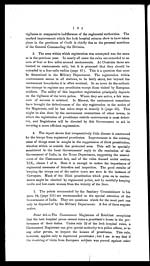Medicine - Institutions > Lock hospitals > Annual report on the working of the lock hospitals in the North-Western Provinces and Oudh > Fourth annual report on the working of the lock-hospitals in the North-Western Provinces and Oudh for the year 1877
(145) [Page 1]
Download files
Individual page:
Thumbnail gallery: Grid view | List view
![(141) [Page 1] -](https://deriv.nls.uk/dcn17/7511/75111269.17.jpg)
ORDERS OF GOVERNMENT.
NO. 13 OF 1878.
FROM
THE SECRETARY TO GOVERNMENT,
NORTH-WESTERN PROVINCES AND OUDH.
To
Te Srcy to the Govt of India,
Home mule Department and the
Quarter master genl. Army in India
Dated Allahabad, the 5th August, 1878
SIR,
I AM directed to forward for the information of His Excellency
the Govr. Genl. in Council & H.E. the commander in cheif the annual
report on the working of the lock hospitals in the North-Western Pro-
vinces and Oudh, for the year 1877. The question of amending the
existing law on the subject of contagious diseases is under separate con-
sideration, with reference to the Resolution of the Government of India,
Home Department (Sanitary), No. 357, dated 21a December last.
2. It will be observed that the Sanitary Commissioner has sum-
marised the reports at page 112, and collected together the points on
which orders are required (page 131). The summary is clear, and may
be said to express generally the views of this Government. I am, how-
ever, to add the following remarks :—
| *1875 | ... | ... | 216 |
| 1874 | ... | ... | 238 |
| Ratio of five years previous to opening of lock hospi- tals |
... | ... | 273 |
(1.)—The ratio* of admissions into hospital per 1,000 of the troops in
1877, on account of venereal diseases, was 197.
This contrasts badly with the ratio in 1876,
which was only 170. But it is an improve-
ment on the figures* of 1875, 1874, and of the
five years preceding the establishment of lock hospitals. The latter have
evidently been productive of good. There is also the unanimous testi-
mony of the medical officers in charge of lock hospitals that the diseases
contracted by the men are of much milder forms than before.
(2.)—It is difficult to determine all the causes which lead to the very
different ratios of admissions into hospital in the several military stations.
Some of them must be ascribed to the locality of Cantonments, the con-
tiguity or distance of the city, the nature of the Cantonment bazars.
Others are undoubtedly due to the efficiency or laxity of regimental con-
trol, the degree in which the civil and military authorities co-operate,
and the activity of the committee: In Agra, the lock hospital sub-com-
mittee seldom met, and it was not till the end of the year that the
members knew that disease bad increased (page 6). In Benares, registered
women were examined only twice a month, whereas in other stations
examinations are held very frequently. In Cawnpore, the police were
active, and managed to detect 11 cases of illicit prostitution. In Agra
only one case was brought to light. But the most powerful agent is the
Set display mode to: Large image | Zoom image | Transcription
Images and transcriptions on this page, including medium image downloads, may be used under the Creative Commons Attribution 4.0 International Licence unless otherwise stated. ![]()
| Permanent URL | https://digital.nls.uk/75111267 |
|---|




